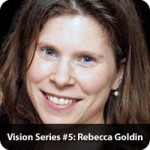One of our most important assignments this semester is the Community Events Observation assignment, through which you will examine how to work within a community to conduct research and generate positive change. Here’s one way in which you can start this work for NCLC 203 on Monday, 31 January.
The University sponsors an annual Visions Series of lectures by faculty on key social, political, economic, cultural and personal issues. On Monday, 31 January, Associate Professor Rebecca Goldin will talk about the uses and misuses of statistics in the media. These lectures are usually quite lively, with good Q & A sessions, and often followed by a reception with the speaker.
Although we would not normally recommend a formal lecture as a community event, this lecture is so relevant to our focus on Inquiry into Action, especially the segment on how we draw conclusions from data, we should be delighted to count this lecture as one (out of a total of 4) of your community event observations for this semester. You will find detailed instructions on the concepts you should be considering before and during any community event in the guidelines for the assignment. In the meantime, read the outline of the lecture below, and remember that the lecture takes place in the Center for the Arts.
Should You Believe It? Use and Misuse of Statistics in the Media
Rebecca Goldin
Associate Professor of Mathematical Sciences
Monday, January 31, 2011 at 7 p.m.
News accounts are filled with numbers and implicit advice. How much coffee is too much? Is the internet making us smarter or dumber? Do vitamins improve our health or harm us? In contexts as diverse as criminal courts, opinion surveys, and our personal health, statistics are playing a larger and larger role. Despite our need for clear rendering of numerical information, many media accounts using statistics are misleading.
Eye-catching headlines typically promote exaggerated benefits of medical treatment, exaggerated risks of everyday living, and tragic or comic opinions of survey respondents. We will use recent news accounts, both humorous and serious, to illustrate this process and to suggest how to become savvy news consumers. Numbers can be powerful when we move past politics and morality to clarify what science actually tells us, what it does not, and what it cannot.
http://nclc203spring2011.onmason.com/assignments/community-events-observation/
